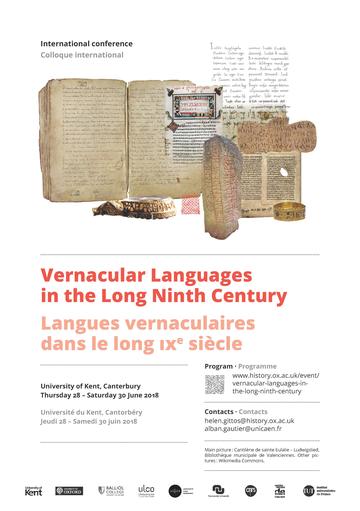Vernacular languages in the long ninth century

The long ninth century was an important period for the history of vernacular languages in Europe in both Eastern and Western Christendom. Some of those languages appeared for the first time in written form and others changed considerably. This conference will compare and contrast the different histories of a wide variety of languages in this period including Old English, Old Norse, Frisian, Slavonic, Old Irish and Old High German. We will address questions such as: To what extent were their histories inter-connected? Why was this happening in the ninth century? To what extent was this mainly a religious and elite phenomenon or was it more widespread?
Speakers include: Alban Gautier (Université de Caen Normandie), Robert Gallagher (University of Oxford), Francesca Tinti (Universidad del País Vasco), Judith Jesch (University of Nottingham), Bianca Patria (Universitetet i Oslo), Marco Mostert (Universiteit Utrecht), Helen Gittos (University of Oxford), Martin Gravel (Université Paris VIII Vincennes Saint-Denis), Katy Cubitt (University of East Anglia), Máire Ní Mhaonaigh (University of Cambridge), Elizabeth Tyler (University of York), Anna Adamska (Universiteit Utrecht), Thomas Lienhard (Université Paris I Panthéon-Sorbonne), Mirela Ivanova (University of Oxford), David Kalhous (Österreichische Akademie der Wissenschaften), Magali Coumert (Université de Bretagne occidentale, Brest), Jens Scheider (Université Paris Est Marne-la-Vallée), Christine Rauer (University of St Andrews), Ciaran Arthur (Queen’s University, Belfast), Élise Louviot (Université de Reims Champagne-Ardenne), Pierre-Yves Lambert (École pratique des hautes études, Paris), Nicolai Egjar Engesland (Universitetet i Oslo), and Benoît Grévin (Centre national de la recherche scientifique, Paris).
Conference Programme
Thursday 28th June
13:00 Registration
13.30 Introduction
Alban Gautier (Université de Caen Normandie), Introduction
14.00 Old English
Robert Gallagher (University of Oxford), Old English in Ninth-Century Anglo-Saxon Charters: When, Where and Why?
Francesca Tinti (Universidad del País Vasco), Qui nominatur nostra propria lingua: flagging code-switching in Anglo-Saxon charters
15.00 Coffee
15.30 Old Norse and Frisian
Judith Jesch (University of Nottingham), Memorial rune-stones and the early Viking Age
Bianca Patria (Universitetet i Oslo), Skaldic innovations: foreign influences and traditional forms in the development of a new poetic language in ninth century Scandinavia
Marco Mostert (Universiteit Utrecht), The Frisian exception. Why are there hardly any traces of written Frisian from the eighth and ninth century?
17.00 Discussion
19.00 Dinner
Friday 29th June
09.00 Liturgy and Preaching
Helen Gittos (University of Oxford), Liturgy in Vernacular Languages in the early Middle Ages
Martin Gravel (Université Paris VIII Vincennes Saint-Denis), Translating chapter 17 from the Acts of the council of Tours (813): reconsidering the shift from Latin to proto-roman languages
Katy Cubitt (University of East Anglia), Vernacular penance and confessional prayers in the tenth-century: some questions of datin
10.30 Coffee
11.00 Two Kings and their Networks
Máire Ní Mhaonaigh (University of Cambridge) & Elizabeth Tyler (University of York), Insular historiographies and theorising the vernacular: an entangled approach
12.00 — Discussion
12.45 — Lunch
14.00 Slavic languages and Eastern Christianities 1
Thomas Lienhard (Université Paris I Panthéon-Sorbonne), L’apparition du slavon écrit : où et pourquoi ? (v. 860 – v. 925)
Mirela Ivanova (University of Oxford), Inventing and defending the Slavonic written word in early medieval Bulgaria
Anna Adamska (Universiteit Utrecht), A missed opportunity? Fortunes and misfortunes of the Slavic written vernaculars beyond the ninth century
15.30 Coffee
16.00 Slavic languages and Eastern Christianities 2
David Kalhous (Österreichische Akademie der Wissenschaften), Legitimizing the vernacular. Old Church Slavonic as a liturgical language and its defence in ninth and tenth century hagiography
Georgian slot (to be confirmed)
17.00 Discussion
19:00 Dinner
Saturday 30th June
09.00 Texts and Contexts
Magali Coumert (Université de Bretagne occidentale, Brest) & Jens Scheider (Université Paris Est Marne-la-Vallée), Lex Salica between oral and manuscript tradition
Christine Rauer (University of St Andrews), Continental and Irish models for ninth-century Anglo-Saxon hagiography?
Ciaran Arthur (Queen’s University, Belfast), 'The Heliand in Anglo-Saxon England: Translation, Transmission, and Turbulence'.
Élise Louviot (Université de Reims Champagne-Ardenne), Heliand’s and Otfrid von Weissenburg’s Evangelienbuch’s handling of direct speech: a common vernacular model?
11:00 Coffee
11.30 From Old to Middle Irish
Élise louviot, Heliand’s and Otfrid von Weissenburg’s Evangelienbuch’s handling of direct speech: a common vernacular model?
Nicolai Egjar Engesland (Universitetet i Oslo), Re-contextualizing the Auraicept na nÉces
12.30 Discussion
13:00 Concluding remarks by Benoît Grévin (Centre national de la recherche scientifique, Paris)
Register here: https://kenthospitality.kent.ac.uk/Register/Vernacular
Event organisers: Dr Helen Gittos, helen.gittos@balliol.ox.ac.uk and Dr Alban Gautier / alban.gautier@unicaen.fr
Registration/ bookings organiser: Kelly Leonard / eventregistrations@kent.ac.uk / 01227 828000



